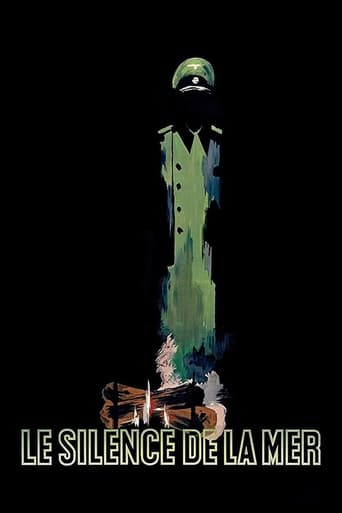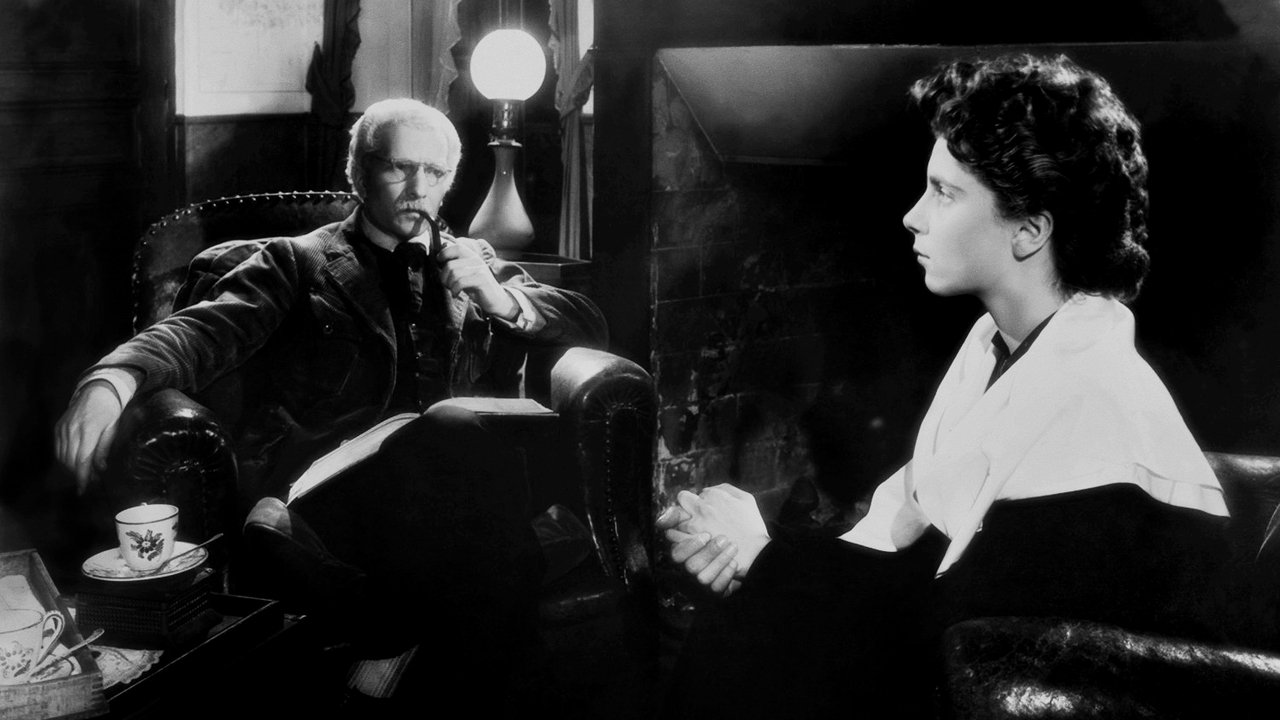ironlion106
And so Jean-Pierre Melville's career began with this very impressive feature debut. While not quite the same kind of film from him as I'm used to (keep in mind the only other Melville films I've seen are Le Deuxième Soufflé and Le Samouraï), it delivers every bit of quiet tension and restrained filmmaking I've come to love from this director. The vast majority of the film is either narration directly out of the book on which the film was adapted, or Howard Vernon delivering hauntingly beautiful monologues. Vernon's performance is flawless and never fails to draw you in. All of this great stuff aside,Le Silence de la Mer has some room to grow. Biggest issue being that it's basically a stage play. The medium is hardly utilized and it makes for a semi- dull viewing. This isn't the fault of Melville or anybody else, that's just what the source material calls for. As perfectly executed as Vernon's monologues were, I just can't help but feel that the story could have had so much more to offer. But this, again, is the fault of the author of the book, not Melville. All in all, Le Silence de la Mer is a very good start to Melville's career and definitely one not to let pass you by.
MisterWhiplash
Here's the set-up: an uncle and his niece (the latter Nicole Stephane, who would appear as the female lead in Melville's follow-up Les Enfants Terribles) are living in a small town in France and it's the early part of the war in 1941. A German officer is wounded and has to spend some time to heal (not serious enough for a hospital it would seem, but not strong enough to fight yet), and immediately things are tense as the French citizens refuse to say a word or even look up - their own form of silence as protest - but he doesn't mind.Officer Werner von Ebrancc in fact will talk to them or, perhaps, in a way, to himself without any regard. For the most part, with maybe just one or two minor exceptions, we only hear the uncle in voice-over. Lots and lots of voice-over, narrating about things that we see on screen and what the officer's silence holds over moments, or when he does things like play the harmonium - a melody that his niece hasn't played in years. So much significance in six months or so of this man just *being* there. What will they do? Will communication finally happen vocally, or with physical gestures and things like hands? I imagine it'll be the same for those who come to La Silence de la Mer that admirers (does one say fans perhaps) of Jean-Pierre Melville's other films, primarily his 60's crime thrillers or the other WW2 resistance epic Army of Shadows: this does not really seem very much like those later movies. In 'Silence', it's got wall-to-wall musical score for one thing by Edgar Bischoff; not a bad score by any means, but it is strange and sometimes the music is accompanying one of the many monologues delivered by the German soldier Werner, which is in contrast to many of Melville's films which lack music in favor of silence. And there is a great deal of narration from the French uncle (just credited as 'L'Oncle' played Robain) which is also in contrast with Melville's style. So it was a little jarring to come to his first film after seeing so many - this doesn't make it a bad thing, just different and unexpected.The context always matters of course: this was made very soon after the end of the second world war, which Melville fought in and was part of the French resistance. The film's adapted from a book, which is pretty clear by not only the framing (like a Cocteau film of Beauty and the Beast, which gets checked here in reference by the way by Werner, it opens and ends with a book on screen), and it was a book that was kind of an underground release. Melville even adapted it without the rights, something that would almost make it a "fan-film" today, though Vecors liked it enough to let it see release following approval from a 'jury' (see the trivia). But the point is that the film must have been something important to see in France at the time, part of France looking back at what had happened to them, what they allowed, and of course the fervent, dastardly German/Nazi mind-set, and take some steps to move forward.The narration may be too much at times (it's part of Melville's 'anti-cinematic' aesthetic in relation to adapting a book to the tee), and at first I was bothered by it. It made the film seem old and dated. But as the film went on and I got more into Vernon's performance, it seemed to make more sense about the tension and how, step by step, incrementally, there's a connection made between these very disparate characters. I also liked the last half hour where we see Werner outside of the house and at German HQ or talking with fellow officers and the contrast of his own awakening to culture and French artistic expression with the dogmatic nature of Nazism. It's even a braze and courageously made movie ultimately for how it posits the French civilians like these two (not so much characters but apt props for the narrative) and Werner, who is fleshed out and conflicted and kind of a tragic figure. It's a film the more I think about it I like more, even as it's not as impressive as Melville's later crime films. For what he had to work with (clearly a low budget, mostly shot in the house), Melville gets a lot out of his imagery and slow-build up.
DexIMF
"Le Silence De La Mer" is a film based on the novel of the same name written by Jean Bruller which was published secretly in Nazi-occupied France. The film plays like a video-book of the novel as most of the story is told either through narration or monologues. The film's such patience-testing style is quickly suggested by its opening scene which plays as if it literally drops the viewer inside the novel.The film is told through two point of views. An old french man, who lives with his niece, and seems to be quite content with wealth and art. The other viewpoint is the Nazi soldier who stays in their house for a quite period of time. The key to delve into the former's mind is by his narration, and the latter's is by his monologues. It's an interesting dynamic which really shines and gets its point across over the course of time."Le Silence De La Mer" is Melville's debut feature, and it's fascinating how clear he is about the subject and style of the film. It's no wonder that his later films grew to be even more tightly constructed.The film opens with lines which suggest that the feature is in no way constructed to present as a solution to conflict between France and Germany, but I'm sure both Bruller and Melville, and the rest of us would have wondered, "..but what if?".
Prof-Hieronymos-Grost
In a small town in occupied France, the tranquil life of the occupants of a country house (an uncle and his niece) is disturbed when a new German officer, Lieutenant Werner Von Ebrennac is billeted and takes up residence in their home. Not wanting to be seen to be collaborating with the enemy they both agree not to let the foreign presence interfere with their everyday life and to this end they even refuse to acknowledge their new guest when he speaks to them. Von Ebrennac a musician and budding composer understands their stubbornness and each night he joins them in their living room and regales them with his stories, on topics such as his love of France, the influence of his father, the war and his passion for music, all of his thoughts and questions go unanswered by the uncle and his niece, he puffs on his pipe while she continues to knit, all the time never making eye contact with their unwanted guest. Privately they both seem to have a growing respect for Von Ebrennac,a learned, romantic and cultured man who imparts his knowledge of French literature with a vitality that can't help but enthuse the listener, he even resorts to wearing civilian clothes in order that his hosts feel more comfortable in his presence.After the fall of France to the occupying Nazi's, Jean Pierre Melville who fought in the famous battle of Dunkirk found himself demobbed from the French military and subsequently ended up in London where he tried to do his part for the French Resistance, it was there that his love of Cinema gave him his first inkling of what his first project would be, he wanted to adapt the infamous and iconic Resistance book, La Silence de la Mer by Vercors, After the war Melville approached Vercors looking for his permission to adapt his work, which was denied. Despite this setback Melville set out to make the film anyway, another problem that beset him was that he had no Cinematic training and in the highly regulated and unionised France this was going to be a sticking point if the film was going to be made, but his determination fuelled the project and soon Vercors was on board, after Melville made him an offer that the film would never be released unless it was accepted by an esteemed Resistance audience at a private screening and if it didn't compromise his book, of course the film was widely accepted with only one vote against. Melville strived for authenticity and even used Vercors' own home for the filming and also employed actors that had been in the Resistance.Jean-Marie Robain plays the Uncle and his voice is for the most part only heard in voice-over, both he and Nicole Stéphane's (the Niece) performances by their nature have to be very subdued and all emotion is shown with but the slightest of glances and hardly any movement. Vernon has nearly all the on screen speaking parts and the film is broken up into his ever more emotive musings on life that border on soliloquy and its his performance that holds together the film, when after a brief trip to Paris to meet some old friends, he returns devastated in the knowledge of the atrocities that are to happen and that have been happening, he must now admit to his hosts that his interpretations of his countries ideals have been erroneous. A sublime debut from Melville that influenced many of his fellow countrymen, like Bresson, Truffaut and Godard, with but the slightest hint of what direction his career would take, his gathering together of first timers succeeded in creating a film that bucked many of the filmic trends of the day and as such helps retain its freshness and power even today.


 AD
AD


